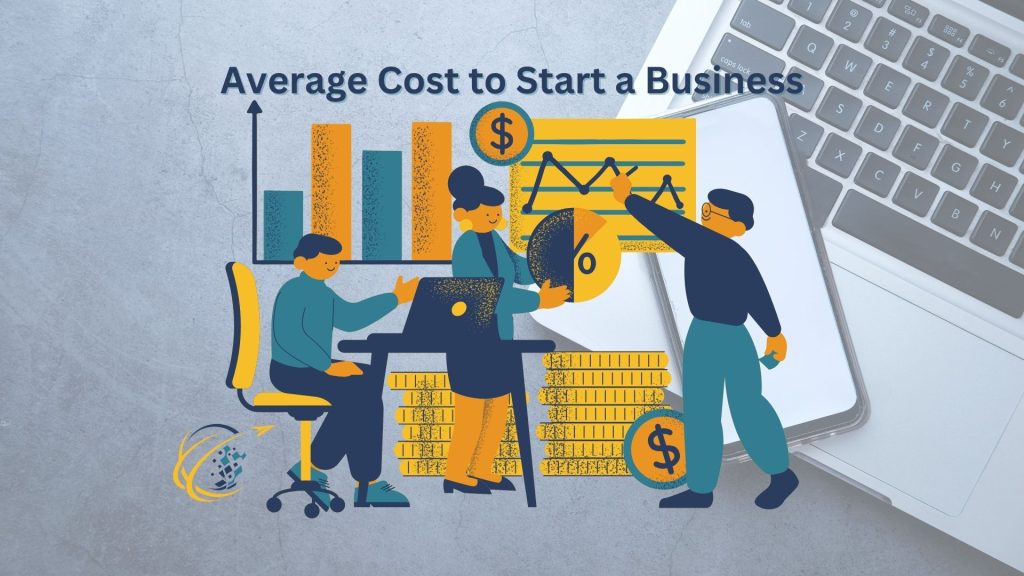
Understanding the average cost to start a business is a crucial step for any aspiring entrepreneur. Many factors determine the overall costs, including industry, location, and the type of business you’re planning to launch. Whether you are starting a small home-based business or a full-scale retail operation, having a clear idea of the expected expenses can help set realistic financial expectations. Preparing for these costs allows for better financial planning and helps increase the chances of long-term success.
The average cost to start a business can vary widely depending on the industry. For example, according to the U.S. Small Business Administration, most small businesses require startup capital between $3,000 and $5,000. However, businesses in specific sectors, like manufacturing or retail, can have startup costs that far exceed these figures due to equipment, inventory, and facility requirements. Understanding the costs associated with your particular type of business is essential for building a successful and sustainable operation.
Factors Influencing the Average Cost to Start a Business
Several factors influence the average cost to start a business. One major factor is the industry in which you plan to operate. A service-based business, like consulting or freelancing, generally has lower startup costs compared to businesses that require a physical location or significant inventory. Service businesses may only need essentials like a computer, website, and professional software, which keeps overhead costs low. On the other hand, brick-and-mortar businesses, especially in retail, require rent, utilities, and inventory, all of which increase initial costs.
The location of your business also plays a key role in startup expenses. Businesses in metropolitan areas typically face higher rent and operational costs compared to those in rural or suburban locations. Additionally, some cities and states have higher licensing fees, permits, or compliance costs, which can further raise the average cost to start a business. Entrepreneurs should research the costs specific to their location to better estimate startup expenses.
The structure of your business can also affect costs. Starting a sole proprietorship or an LLC (Limited Liability Company) will have different initial legal fees and filing costs. In some states, setting up an LLC can cost anywhere from $50 to $500, depending on filing fees. Corporations, which require more complex legal documentation and accounting, may incur even higher costs.
Technology requirements are another important factor. Businesses that rely heavily on digital infrastructure, such as e-commerce or tech startups, may need to invest significantly in website development, software, and cybersecurity. Although these costs are necessary for ensuring smooth operations, they can raise the initial investment required to get the business off the ground.
Hidden Costs Often Overlooked
While focusing on major expenses, it’s easy to overlook hidden costs that can add up quickly. Marketing is one of the most commonly underestimated costs when calculating the average cost to start a business. Creating a website, running digital ads, or printing promotional materials can lead to substantial expenses. New businesses must also invest in branding, which includes logo design, business cards, and social media setup. Without a solid marketing strategy, even the most innovative businesses may struggle to attract customers.
Another often-overlooked expense is insurance. Business insurance, whether it’s general liability, workers’ compensation, or property insurance, is essential for protecting your business from unforeseen risks. Depending on the industry and size of the business, insurance premiums can range from a few hundred to several thousand dollars annually. Entrepreneurs should include insurance costs in their startup budget to ensure they are fully covered.
Hiring employees is another cost that can quickly escalate. Beyond wages, employers must account for employee benefits, payroll taxes, and workers’ compensation. If a business plans to hire right away, these costs must be factored into the initial budget. In the early stages, some businesses may opt to outsource certain roles or hire contractors to reduce upfront expenses, but the long-term goal should be to establish a reliable workforce as the business grows.
Financing the Costs to Start a Business
Most small businesses rely on a mix of personal savings, loans, or investments to cover startup costs. Personal savings is often the most straightforward financing method, as it doesn’t involve debt or outside investors. However, using savings requires careful financial planning and may not be sufficient for larger business ventures.
Bank loans are another popular option for financing startup costs. Traditional bank loans or Small Business Administration (SBA) loans can provide the necessary capital, but they also come with interest payments and requirements for collateral. Securing a loan often depends on the business owner’s credit score, business plan, and financial projections.
Venture capital or angel investors offer alternatives for entrepreneurs who want to scale quickly. However, this route often requires giving up a portion of equity in exchange for capital. While these investors can provide significant funding, they may also want a say in the business’s operations and strategic decisions.
Crowdfunding platforms like Kickstarter or Indiegogo have also become viable options for raising startup capital. These platforms allow businesses to present their ideas to a broad audience and secure funding from individual backers. Crowdfunding is particularly useful for product-based businesses, as it can generate interest and sales before the product officially launches.
Managing Costs for Long-Term Success
Understanding the average cost to start a business is just the first step in ensuring long-term success. Once the business is operational, managing expenses becomes equally important. Regularly reviewing financial statements, maintaining a solid budget, and adjusting for unexpected costs are crucial for staying profitable. Businesses should set aside reserves for emergencies and reinvest in the company to fuel growth. It’s also important to regularly evaluate operational efficiency and look for ways to reduce costs without sacrificing quality.
As businesses grow, they may face new expenses, such as expanding locations, scaling production, or hiring additional employees. These changes should be factored into future financial planning. Additionally, staying up-to-date with industry trends and adjusting pricing strategies can help businesses remain competitive while managing costs effectively.
The average cost to start a business depends on several factors, including industry, location, business structure, and technology requirements. By understanding these costs and planning accordingly, entrepreneurs can set realistic expectations and increase their chances of success. While some expenses are predictable, hidden costs such as marketing, insurance, and employee wages should also be considered in the startup budget. Securing the right financing, whether through personal savings, loans, or investors, is essential for covering these costs and ensuring the business can thrive. Long-term success requires careful financial management, the ability to adapt to new challenges, and a commitment to reinvesting in growth.

